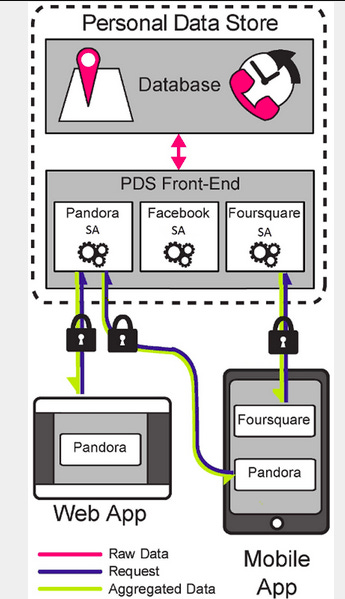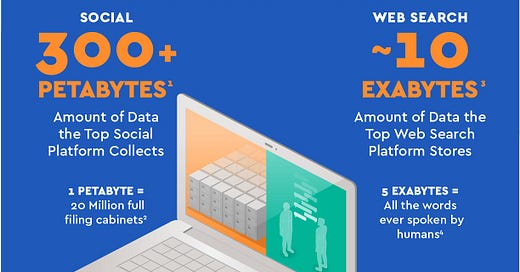I run regularly & a lot of my runner friends are hugely turned on by personal metrics with GPS enabled devices! Wearables collect tremendous amounts of data. The technologies surrounding wearables allow that data to be used and analyzed in a variety of ways. The “quantified self” is an emerging trend in the digital health space. Apart from this there a huge amount of Digital exhaust that I generate which today I hand over to Google & Facebook.
So, what is the value of our data? If you want to know an exact number, try the personal data cost calculator I found on Financial Times. By answering a set of questions about your demographics, consumer habits, health, and marital status, the algorithm predicts the economic value of your personal information.
https://ig.ft.com/how-much-is-your-personal-data-worth/
Don’t be surprised by the value of your data-mine was $1.1278.
Western Digital estimated the worth of personal data to brands by dividing the total U.S. digital advertising spend by the number of Americans accessing the Internet. The 2018 estimate was $341.08 per American. How much are you getting? Nothing as yet. We are all producing terabytes of digital data over a period of time. It’s my data & yet I don’t get monetary value for it!
Personal metadata is the digital information about users' location, phone call logs, or web-searches – this is at the heart of how value can be added to you. From Google's search to Netflix's “movies you should really watch,” from Pandora to Amazon, metadata is used by commercial algorithms to help users become more connected, productive, and entertained.
MIT researchers have this to say about Metadata: "This data is currently collected and stored by hundreds of different services and companies. Such fragmentation makes the metadata inaccessible to innovative services, researchers, and often even to the individual who generated it in the first place.”
Your data can serve as a medium of exchange—as cellist Zoë Keating noted in suggesting that instead of sending her royalties, streaming music services should provide her with data about her listeners
Many companies are exploiting consumer data without permission and without compensating consumers. Privacy regulations like GDPR and CCPA are causing third-party data sources, data brokers, and brands to re-evaluate their business models, though this will take time.

Killi is a new service that pays users to share their information with brands and provides transparency and security via blockchain.
Through a mobile app, users can input their name, e-mail, birth date, gender, as well as share location-based data. In addition, they can take surveys. All of this in exchange for money!

Startups such as Personal, Reputation.com, and Datacoup, among others, have tried to help people monetize their own data but in the past, this has not moved ahead because of lack of scale.
But today there is new technology that can enable this. Researchers at the MIT Media Lab have created a personal data store system, called OpenPDS that protects your personal data while still allowing applications to access the information they need. An MIT researcher has this to say: “Instead of every application trying to collect data on the phone and send it back to servers to do the processing, a user collects their own data”. This system works along with another called SafeAnswers, a new way of protecting the privacy of metadata through a question and answer system. MIT describes it like this: "When performing computation (e.g. in answering a query), the data-repository must always return “safe answers” and never raw data. This concept seeks to address the issue of data privacy and the potential danger of de-identification (of Personally-Identifying Information, or PII) through the correlation of multiple responses”.
As users, we have a huge number of data sources that we interact with on a daily basis. We need to actually own our data by being able to keep it in a secured space, a Personal Data Store (PDS) acting as a centralized location where this data can live. Owning a PDS would allow us to view and reason about the data collected. We can then truly control the flow of data and manage fine-grained authorizations for accessing his data.

Richard Thaylor, a professor of economics and behavioral science at the Booth School of Business at the University of Chicago has this very interesting proposition.
This is what Richard provocatively suggests:
“If a business collects data on consumers electronically, it should provide them with a version of that data that is easy to download and export to another Web site. Think of it this way: you have lent the company your data, and you’d like a copy for your own use”.
I think this is a powerful idea & can have a huge impact on consumers & also create a huge number of intermediary companies who help consumers make sense of their data. The idea of using analytics as “personal power” will definitely be resisted by organized companies & governments, but it has the power to allow the customer to control & manage her relationships with Telecom, Retail & myriad other companies.
Three things are going to be game-changers:
COVID has created awareness amongst consumers about how much of their data is out there-especially Location data & its uses are today much clearer to consumers.
Consumers are getting more sensitive about their personal information.
Google has announced the demise of the third party cookie by 2022
So privacy, the growth of Blockchain & the demise of the 3rd party cookie are trends that will come together to give business models like Killi their day in the sun.
Let us look forward to new ways in which this will evolve over the next few years.



